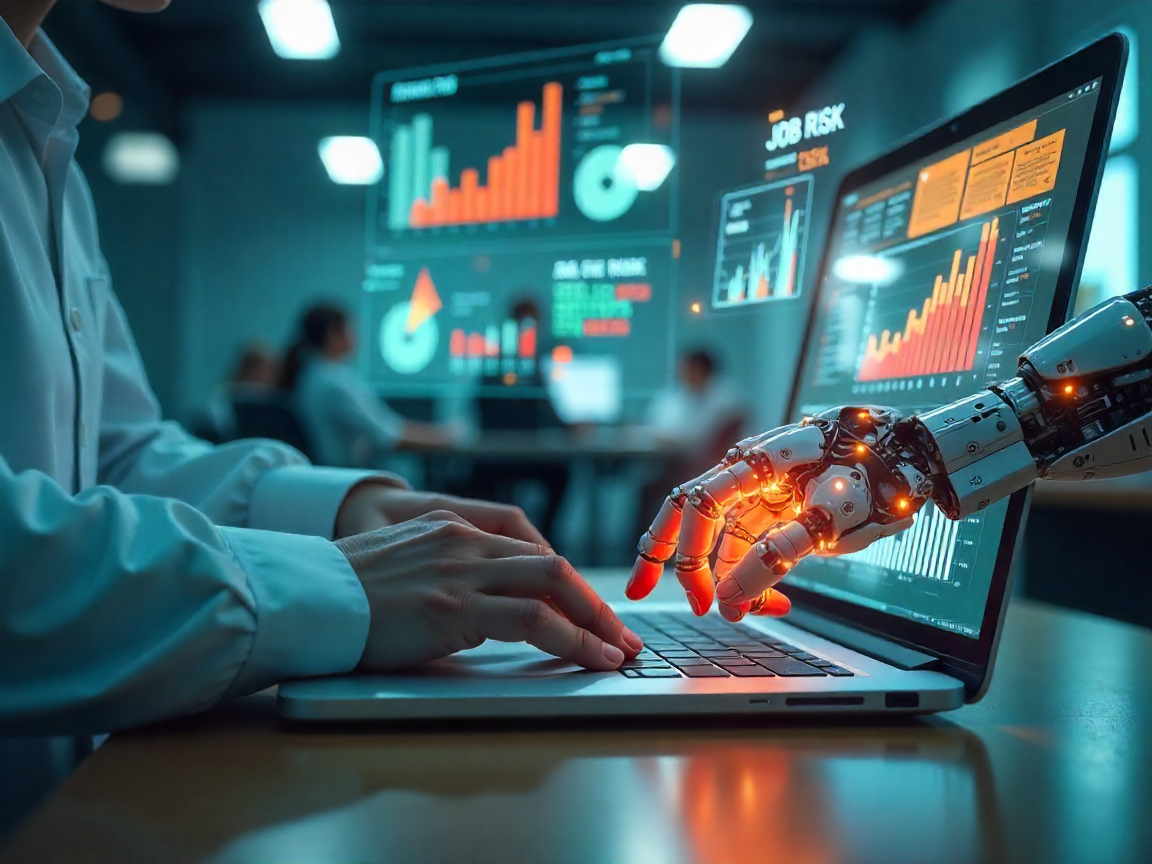
The AI Disruption Is Here And It’s Not What We Expected
Do you recall, when everybody believed that robots would be used first to replace workers in factories? It appears that AI will take away the white-collar jobs. Goldman Sachs report even predicted that up to 300 million full-time jobs around the world may be automated due to AI, though the twist here is that those jobs are often very well, paying jobs in the fields of finance, law, tech(1).
Why? Since, generative AI will be good at data, language and repetitive decision-making. In the meantime, opportunities that demand emotional intelligence or random physicality (consider nurses, therapists or electricians) are holding firm. So what does this new research show?–and what can it mean to your career?
The Most Vulnerable Jobs: AI’s First Targets
The Target Is on Finance, Law and Tech
Research done by McKinsey (2024) revealed that 70 percent of work in data analysis, legal document review, and customer service activities could very soon be automatized. The proof? See JP Morgan and its AI, COiN, which reads through 12,000 contracts in seconds, at one time the responsibility of 360,000 hours of labour, by lawyers. Or the HR AI developed by IBM, which reduced its hiring personnel by a third through taking care of routine requests.
Even imaginative occupations are not safe. Duolingo has laid off 10 per cent of its contractors because GPT-4 has been demonstrated to be competent at creating language exercises. In the words of legal futurist and book author Richard Susskind:
“AI will not substitute all lawyers-but it will substitute non-AI using lawyers.“
Among some of the jobs that are at high risk include:
- AI crunches numbers faster data analysts (Steve Brock)
- Copywriters (CHATGPT can do a decent initial draft)
- Radiologists (AI identifies tumors employing humans in particular researches)
Surprisingly Safe Jobs: Where Humans Still Dominate
Why Nurses, Therapists, and Tradespeople Are “AI-Proof”
When Wall Street panics, researchers at MIT and Brookings found emotional-intelligence, adaptive, or operationally savvy job functions are facing pushed-back assimilation by automation.
- Therapists: AI simply can not emulate human empathy (not yet).
- Electricians & Plumbers: Every job site is different—robots struggle with unpredictability.
- Teachers: A personalized mentorship is difficult to automate.
Even menial tasks such as a janitor are not in danger as much as one might imagine as even AI is incapable of working in dirty environments as we are.
Real-World Example:
Airbnb CEO Brian Chesky stated the following when questioned about whether or not AI might replace hosts:
“A person does not make a reservation in a home because of an algorithm, but the reliance. Human magic, that is.”
The Hybrid Workforce: AI as a Co-Worker, Not a Replacement
Layoffs to In “Upskilling”
Other companies are eliminating jobs-but others are refashioning jobs rather than cutting them.
- With KMPG, AI writes audit reports and humans review and plan saving 40 percent of work without large-scale layoffs.
- Salesforce is preparing workers with training in what the company calls AI prompt engineering to collaborate with bots.
Wharton professor Ethan Mollick hits it on the spot:
“Not human vs. AI, it is about humans with AI vs. humans without“
The Bigger Picture: Who’s Responsible for the AI Jobs Crisis?
Reskilling Or Resigning?
- Such provided training on AI is financially covered by employers only in 14 percent of the workers (LinkedIn 2024).
- The government in Singapore buys into AI Career Transition programs–and the U.S. remains behind.
By 2025, 20% of CEOs will have linked bonuses to reorganization of workforce on the basis of AI, according to Forrester. Are businesses going to invest in their people- or merely cut expense?
Final Take: Adapt or Get Left Behind
Industrial Revolution was not the end of work but the transformation of work. This will be the same case with AI. Whether your job will change is not the question, it is how.
Something You Can Do Right Now:
- See how exposed your job is to AI (visit WillRobotTakeMyJob.com).
- Study AI technologies that apply to your discipline (ex. ChatGPT to writers, Copilot to coders).
- Advocate AI ethics within your work place- prior to being told what to do.
Something to think about:
It is the only cure to predict the future to create it. Will you manage the power of AI- or will it manage you?